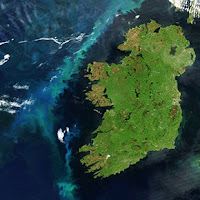The word ‘eve’
in English indicates two things alike: the name of first woman in the world and
the vigil of some important day. In Poland both these meanings meet on 24th
December, as it’s Christmas Eve rich
in traditions (f. ex. non-meat dinner consisting of 12 dishes and ‘shepherds’
mass service at midnight), among them also ‘name
day’ of all people’s parents, Adam and Eve.
This custom of celebrating ‘name day’ as particular saint
patron’s feast day comes from Roman Catholic and Greek Orthodox calendars of
saints. ‘Saint’ is the key word here but Adam
with Eve aren’t saints! Hardly could they be, considering their
disobedience to God’s injunction... He forbade them to eat from the tree
of knowledge of good and evil
but our furthest ancestors broke the Creator’s command and as a result were
expelled from the paradisiac Garden of Eden...
There were other consequences of
‘the first fall’ too: Adam, Eve and all their descendants became mortal, born
in original sin, in need of baptism to erase it, guilty of actual trespasses,
hardworking to stay alive. Moreover the entire natural world was corrupted as
animals divided into prey or predators with all the effects of pain and
death... What a crude punisment for eating
one small apple!
When I heard this story as a child I
felt fury: how could the first human couple be so careless and reckless? Then I
read for numerous times it was only Eve’s guilt and that’s why all women should
be duteous and obedient to men – as it has been (and still is) in patriarchal societies.
That made me even more furious, cause in my opinion if Adam hadn’t wanted the prohibited fruit, he wouldn’t have taken it
and males shifting whole responsibility to females on that basis are simply
immature. Until now this narration from Book of Genesis constantly gives me food for thoughts.
Today I agree more with psychological explanation: paradise is our childhood,
blissful and serene under parental supervision, while expulsion from this
heavenly garden begins with small naughtinesses against them. In teenage years it continues
with bigger insubordinations and – I believe – finishes with first sexual intercourse (forbidden fruit!) as a symbol of total disconnection from ones’ mother and father cause
it means possibility of conceiving a new human being. In ideal world it should
be an act of the biggest maturity...
In this context ‘first sin’ understood
as becoming independent and fully grown is just the evidence of adolescence and
should be perceived as a positive phenomenom! Without rebellion against authorities there’s no psychical progress! According
to psychology each natural crisis in human life is the occasion to development.
Life is a series of lessons and
challenges which help us to grow (Erikson); In the middle of difficulty lies opportunity (Einstein).
So... let’s not blame Eva or Adam
for evil’s existence in universe especially on their name day... I personally
choose to accept my human nature with tendency to making mistakes but also
ability to improve. I believe we are all
light’n’shadow, black’n’white, angel’n’serpent...







